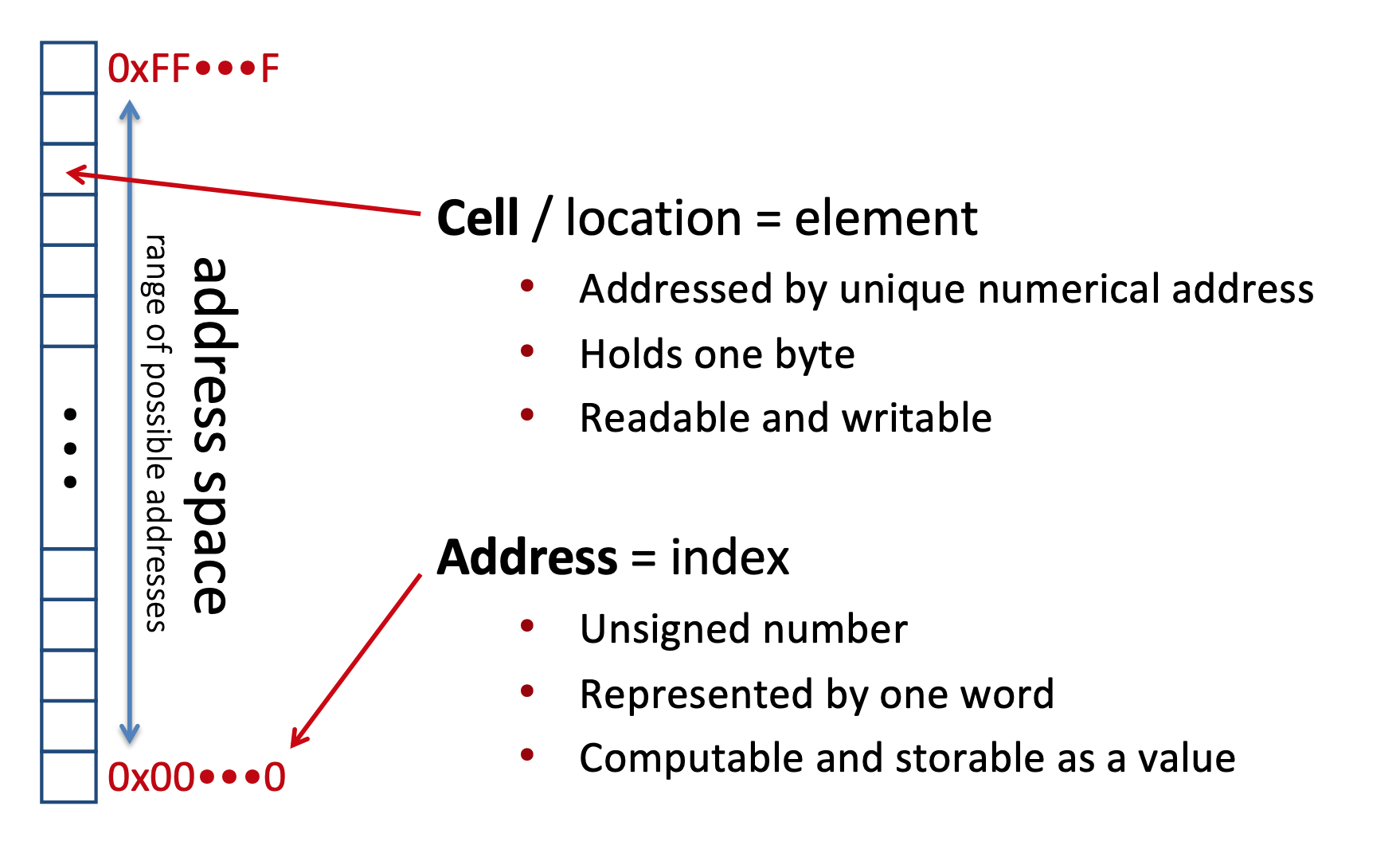CS 208 w20 lecture 1 outline
1 bitwise operators
- warmup: what are the four Boolean operations from the reading?
- take two bit vectors and perform an operation on each corresponding pair of bits (unary operators take just one bit vector)
- a bit vector (also called a bit array or bit string) is a string of zeros and ones of some fixed length
AandBare two bit vectors each 8 bits long:Ais01101001andBis01010101&(AND):A & B = 01000001|(OR):A | B = 01111101^(XOR):A ^ B = 00111100- exclusive-or
A ^ A = 00000000
~(NOT):~A = 10010110
- shift operators are slightly different, they slide the bits \(n\) places to the left or right
- POLL:
0x3<<0x3,0x1a>>0x2 - bits that slide "off" are discarded
=<<=(left shift):A<<2 = 10100100- fill in with zeroes on the right
=>>=(right shift):A>>2 = 00011010- two versions of right shift
logical: always fill in with zeroes on the left

arithmetic: fill in with copies of the most significant bit
- from the reading: for a \(w\)-width bit vector \(x\) with bits \([x_{w-1},x_{w-2},\ldots,x_{1},x_0]\), \(x_{w-1}\) is the most significant bit and \(x_0\) is the least significant bit

- two versions of right shift
- shifting multiplies or divides by 2, just like shifting places left or right with decimal numbers multiplies or divides by 10
- POLL:
- why bitwise?
- often faster and/or lower power consumption than standard arithmetic operations
- in low-memory environments, multiple values often packed into the same handful of bytes, use bitwise operations to extract them
- in C, these operators can apply to any integral data type
- 1-byte (
char) examples:~0x41\(\rightarrow\)~0b01000001\(\rightarrow\)0b10111110\(\rightarrow\)0xbe~0x00\(\rightarrow\)0xff0x68 & 0x55\(\rightarrow\)0x400x68 | 0x55\(\rightarrow\)0x7d0x34<<1 = 0x680x68>>2 = 0x1a- how many bits are in each of these results?
- all of them contain 8 bits (1 byte)! zeroes used to "fill out" the fixed length
- 1-byte (
- EXERCISE: write C code to extract second most significant byte from a 32-bit integer
- given
x = 0b 01100001 01100010 01100011 01100100(spaces added to separate bytes), should return0b 00000000 00000000 00000000 01100010 - shift and mask:
(x>>16) & 0xff
- given
2 logical operators
&&(and),||(or),!(not)- in C, 0 is false, nonzero is true
- logical operators can be applied to an integral type, result is always 0 or 1
&&and||have early termination or short-circuit evaluation (stop evaluating once result is guaranteed)- e.g.,
A && Bwon't evaluateBwhenAis false,A || Bwon't evaluateBwhenAis true
- e.g.,
- 1-byte (
char) examples!0x41 = 0x00!0x00 = 0x01!!0x41 = 0x010x68 && 0x55 = 0x010x68 || 0x55 = 0x01
3 bits in memory
3.1 memory is a long array of bytes
- the index or location of a byte in memory is called its memory address
- the organization of a system's memory is based on the word size
- among other things, the word size defines the number of bytes in a memory address
- all memory addresses will be this same fixed length
- the size of a memory address determines the number of possible addresses (the address space)
- POLL: if our word size is 4 bits, how big is our address space? (how many different bytes can we refer to with the set of possible addresses)
- 16 bytes
- among other things, the word size defines the number of bytes in a memory address
- modern systems use 64-bit (8-byte) words, for a potential address space of \(2^{64}\) bytes = 18 billion billion bytes = 18 exabytes

3.2 data sizes
- not all data is just a single byte
- for example, a C
intis 32 bits/4 bytes wide- what address should we use?
- any chunk of memory is addressed using the first byte (i.e., lowest memory address)
- just like we saw that the bit pattern
0x4e6f21had many different interpretations, the interpretation of data at a memory address depends on both the address and the size
| C type | bytes (32-bit) | bytes (64-bit) |
|---|---|---|
bool |
1 | 1 |
char |
1 | 1 |
short |
2 | 2 |
int |
4 | 4 |
long |
4 | 8 |
char * |
4 | 8 |
float |
4 | 4 |
double |
8 | 8 |
- so a
charstored at memory address0x100would consist of just the single byte at0x100- QUICK CHECK: for an
intstored at this same address, which bytes would it consit of
- QUICK CHECK: for an